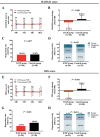A newly designed intensive caregiver education program reduces cognitive impairment, anxiety, and depression in patients with acute ischemic stroke
- PMID: 31483000
- PMCID: PMC6720023
- DOI: 10.1590/1414-431X20198533
A newly designed intensive caregiver education program reduces cognitive impairment, anxiety, and depression in patients with acute ischemic stroke
Abstract
This study aimed to evaluate the effect of a newly designed intensive caregiver education program (ICEP) on reducing cognitive impairment, anxiety, and depression in acute ischemic stroke (AIS) patients. One hundred and ninety-six AIS patients were divided into ICEP group and Control group in a 1:1 ratio using blocked randomization method. In the ICEP group, the caregivers received ICEP, while in the Control group caregivers received usual education and guidance. All patients received conventional rehabilitation treatment. Cognitive impairment (assessed by Mini Mental State Examination (MMSE) score and Montreal Cognitive Assessment (MoCA) score), anxiety (assessed by Hospital Anxiety and Depression Scale (HADS)-A score and Self-rating Anxiety Scale (SAS) score), and depression (assessed by HADS-D score and Self-rating Depression Scale (SDS) score) were assessed at baseline (M0), 3 months (M3), 6 months (M6), and 12 months (M12). Cognitive impairment score at M12 and cognitive impairment score change (M12-M0) were increased, while cognitive impairment rate at M12 was reduced in the ICEP group compared with the Control group. Anxiety score change (M12-M0), anxiety score at M12, and anxiety rate at M12 were decreased in the ICEP group compared with the Control group. Depression score change (M12-M0), depression score at M12, and depression rate at M12 were lower in the ICEP group compared with the Control group. Further subgroup analysis based on baseline features also provided similar results. In conclusion, ICEP effectively reduced cognitive impairment, anxiety, and depression in AIS patients.
Figures




References
-
- Krishnamurthi RV, Feigin VL, Forouzanfar MH, Mensah GA, Connor M, Bennett DA, et al. Global and regional burden of first-ever ischaemic and haemorrhagic stroke during 1990-2010: findings from the Global Burden of Disease Study 2010. Lancet Glob Health. 2013;1:e259–281. doi: 10.1016/S2214-109X(13)70089-5. - DOI - PMC - PubMed
-
- Carota A, Dieguez S, Bogousslavsky J. [Psychopathology of stroke] [in French] Psychol Neuropsychiatr Vieil. 2005;3:235–249. - PubMed

